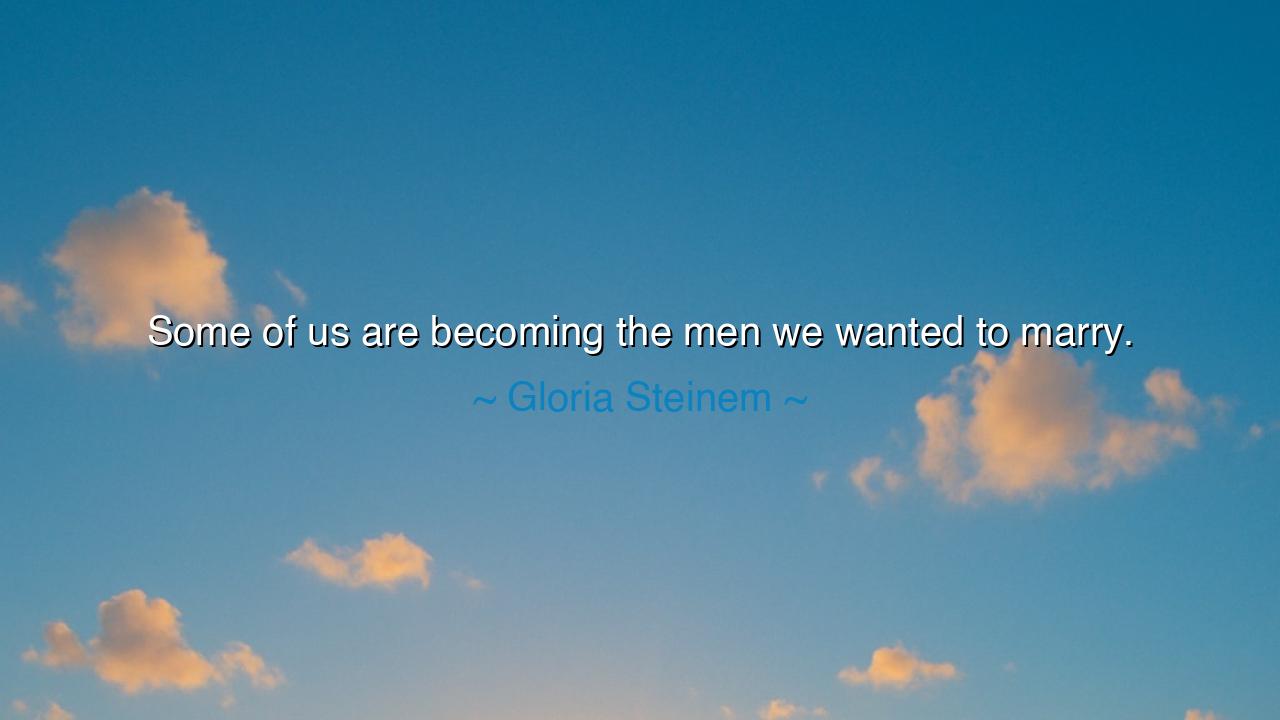
Some of us are becoming the men we wanted to marry.






Hear the daring words of Gloria Steinem, warrior of the women’s movement and breaker of ancient chains: “Some of us are becoming the men we wanted to marry.” At first, the words strike as witty, almost playful, yet beneath their simplicity lies a declaration of triumph. For centuries, women were told that their security, their worth, and their destiny could only be found in the arms of a man—in his wealth, his power, his name. But Steinem proclaimed a new truth: that women need not wait for salvation from another, for they could become for themselves the source of strength, freedom, and purpose they once were taught to seek in others.
In the old world, daughters were raised not to govern, but to be governed. They were told to dream not of their own careers, but of the marriage that would give them standing. A husband was seen as provider, protector, and gatekeeper of opportunity. To marry well was to live well, and to be without a man was to risk ridicule, poverty, or isolation. This was the narrow cage in which generations of women lived, taught to measure their lives not by their own deeds but by the fortunes of their husbands.
It was into this world that Gloria Steinem spoke her revolution. Her words arose from the fire of the feminist movement of the 1960s and 70s, when women marched, organized, and wrote to claim equality in the workplace, in politics, and in society. Her declaration meant this: no longer must a woman seek power through another’s name. She can hold power herself. No longer must she seek provision in another’s wealth. She can earn her own. No longer must she shrink her ambitions to fit the mold of a wife alone. She can shape her destiny as boldly as any man.
Consider the story of Madam C. J. Walker, born to enslaved parents and widowed young. She had no husband to lean upon, yet she rose to become one of the wealthiest self-made women in America, building a beauty empire through brilliance and tenacity. She became not the dependent wife of power, but the embodiment of power itself. In her, we see Steinem’s words fulfilled long before they were spoken: a woman becoming the provider, the leader, the force that society once told her she could only find in a man.
Yet Steinem’s words are not meant to pit women against men, but to break the illusion of dependency. For when women stand strong, they do not abandon love or companionship—they free themselves to choose it truly, not as a necessity, but as a partnership of equals. The marriage once built on hierarchy can then be reborn as union, where neither must be savior nor master, but both walk side by side.
The lesson here is radiant: do not wait for others to give you what you already have the power to create. Whether man or woman, do not search for salvation in another’s strength while neglecting your own. Build your own house of dignity, plant your own fields of provision, craft your own path of freedom. Then, when you walk beside another, it is not out of need but out of choice, not out of fear but out of love.
Therefore, O seekers, hear the wisdom of Steinem: become the strength you once sought in others. Do not be bound by the roles the world assigns you, nor by the limitations whispered into your youth. Rise, build, and claim your place. For the truest marriage is not between one who provides and one who receives, but between two who have already become whole within themselves. In this way, we fulfill the ancient promise of equality and step together into a future of freedom.






AAdministratorAdministrator
Welcome, honored guests. Please leave a comment, we will respond soon